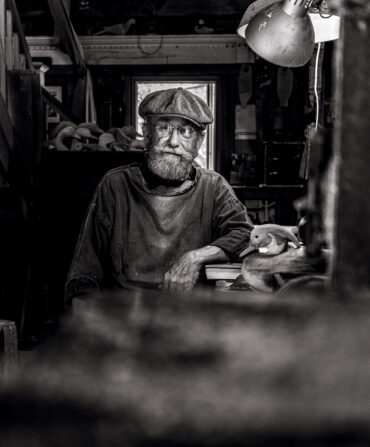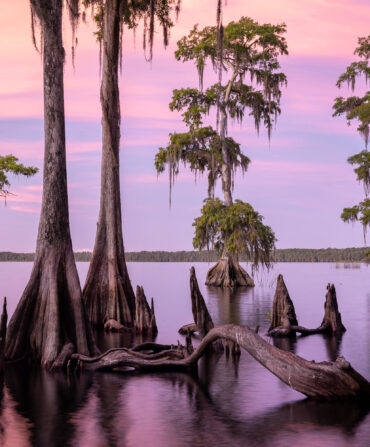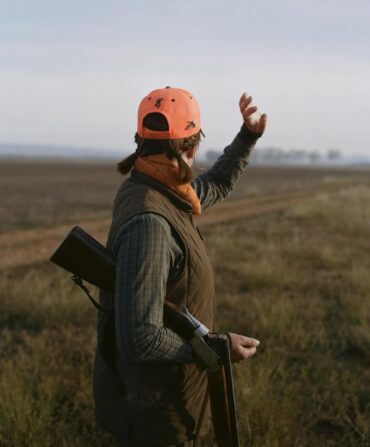Sporting
A Turkey Hunter’s First Shot
A newbie goes into the spring woods after a turkey and finds out what it means to take a bird
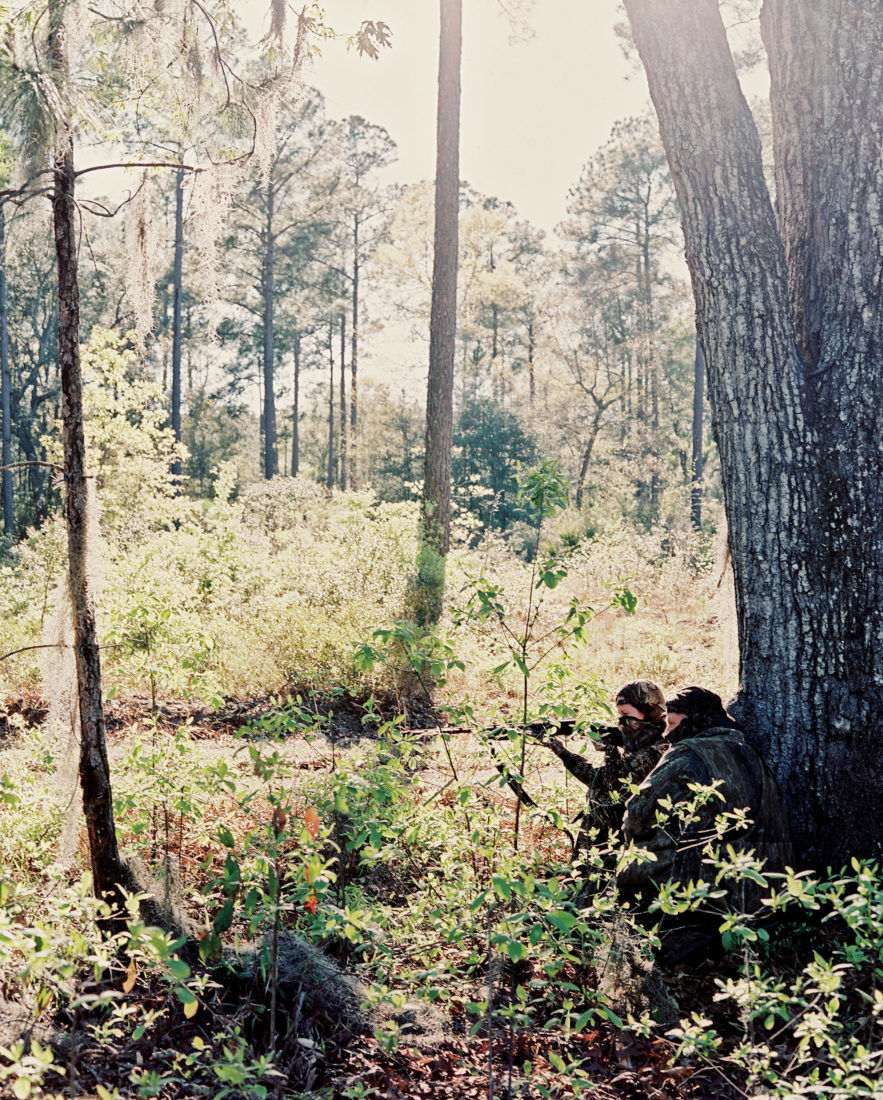
Photo: Peter Frank Edwards
Jay Walea is the sort of man you look at and think, football. He is large, thick, and dense, six foot three, 275 pounds, with the shuffling wince of a former athlete. The Savannah native, forty, did play ball off and on, tackle. And he was fine. But his heart was never really in the game. His real love, his only true passion, true since he’s been old enough to spit, is turkeys.
Walea loves turkeys the way some men love cars. Or the stock market. Or ribs. He admires them, studies them, and is, for the better part of the year, consumed by them, fixated on the day when hunting season arrives and he will rise before the sun, douse himself in DEET, pull on his camouflage, and head into the piney woods where he can meet his beloved turkeys face to face. And shoot them.
There are people who hunt. And there are people who hunt turkeys. The latter are a special breed. Mostly because turkey hunting is really, really hard. To excel at killing longbeards requires Jobian patience, a deep knowledge of bird behavior and habitat, and a willingness to master hen calls, itself a challenge up there with perfecting a Rachmaninoff sonata.
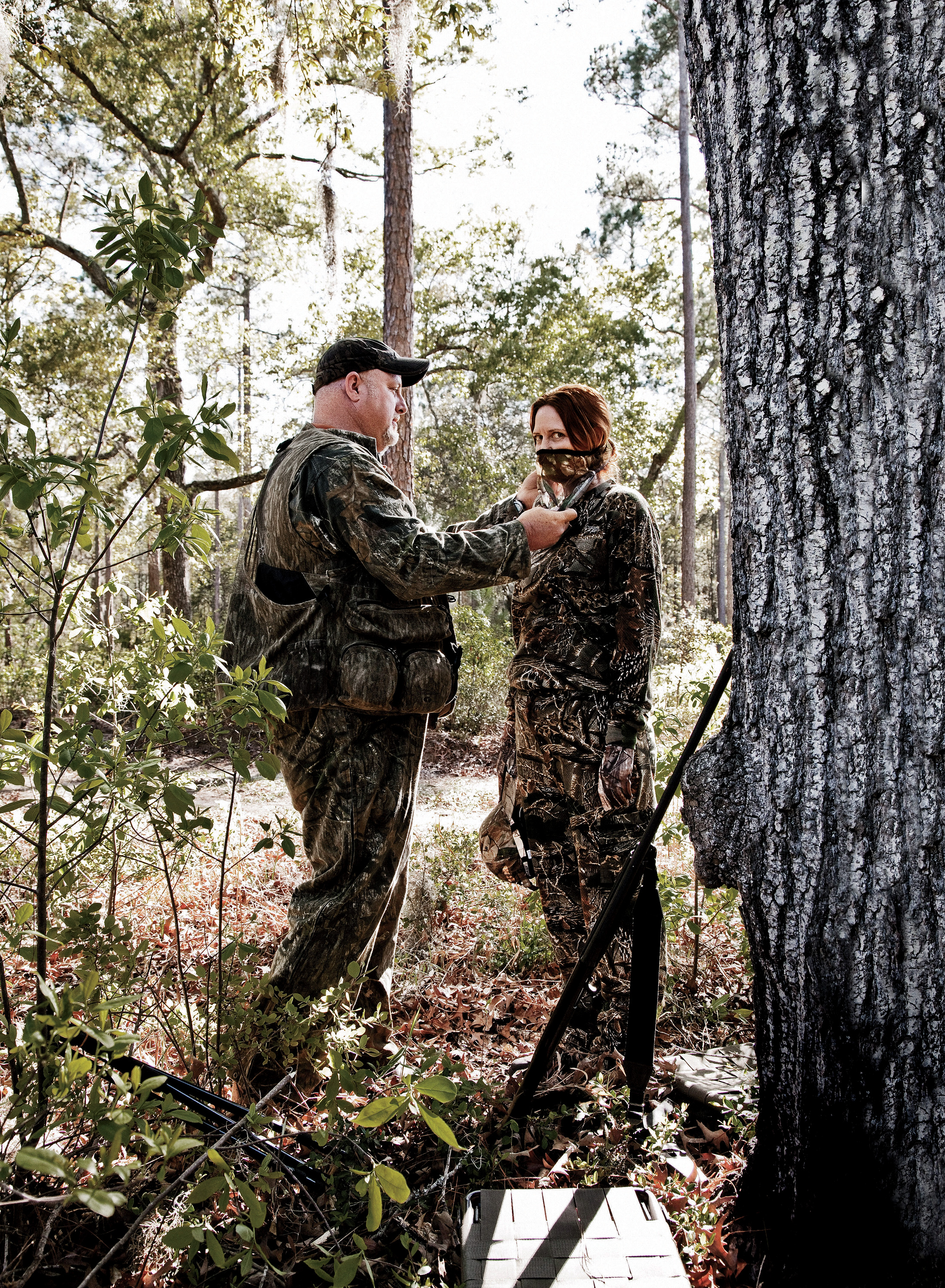
Photo: Peter Frank Edwards
Jay Walea adjusts the author's face mask for the upcoming hunt.
Most critically, turkey hunting demands humility, an uncontestable requirement that eliminates a significant portion of the population from the first cluck. When asked, many turkey hunters cannot articulate the precise reason for their fervor, but let’s be clear—no one loves turkey hunting because it’s macho. Turkey hunting is the hand-knit doily of the hunting genres. Arcane, involved, complex, and to outsiders, never worth the trouble.
Walea came from a hunting family. He killed his first deer at age ten. Other targets followed, with easy success. He was a natural. At ease in the wild. Respectful and in tune with the animals. And yet, something was missing. And that something was the Eastern wild turkey.
“I saw famous turkey hunter Ben Lee give a talk in Savannah,” Walea recalls. “He passed out mouth calls. And listening to him work them fascinated me. Hearing the sounds.”
Eager, a twelve-year-old Walea talked his father into taking him out with his granddaddy’s scratch box call. His father, a wise man with other, less maddening preoccupations, was not enthusiastic. But they went. A whole season passed, Walea getting nothing but an education for his trouble. He was undeterred.
Off season, he practiced his calls. Went into the woods before school and listened to the turkeys. Another season came. Walea, now thirteen, was ready.
“My first time out, I called a bird in,” he remembers, his eyes lit. “The next day, I called in a second!”
Walea smiles and shakes his head.
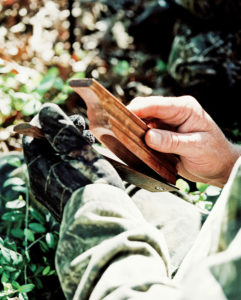
Photo: Peter Frank Edwards
Walea works a box call.
“It was one of the best two days of my life!”
His father was less impressed. “I remember looking over at him during the hunt,” Walea says. “He was asleep.”
Today Walea works and hunts at Palmetto Bluff, a pristine, well-appointed Auberge resort in Bluffton, South Carolina, just a short drive from Savannah. The property began as a Union Camp shooting preserve. Over time it evolved into an opulent retreat committed to conservation, with 6,500 acres of managed forest and 734 more left undeveloped for nature education programs and wildlife habitat. It is probably the only five-star resort in the world that boasts three-hundred-dollar massages, private yacht charters, and a skinning shed.
During turkey season, Walea hosts property owners and interested guests on hunts. He enjoys spreading the gobbler gospel, though most folks find the experience more challenging than expected.
“A lot of guys, especially, have a real hard time sitting still and silent for hours,” he says with a wink.
Walea tracks his birds all year. He does this on foot and in his truck, driving by flocks, chatting to them, as if to a neighbor. At home, he practices his calls until his wife and two daughters implore him to stop.
“There was a time when I had a call in my mouth twenty-four hours a day,” he says. “There is still a call in my pocket three hundred and sixty-five days a year.”
Walea reckons he never stops thinking about turkeys. Where they roost. Where and when they feed. Their patterns and preferences. Such dedication has its rewards. Walea is the world’s best at certain calls. He can putt, yelp, cluck, purr, and squawk with ease. A master of nuance, Walea doesn’t simply imitate a hen, he inhabits one, the calls intricate verbal filigree.
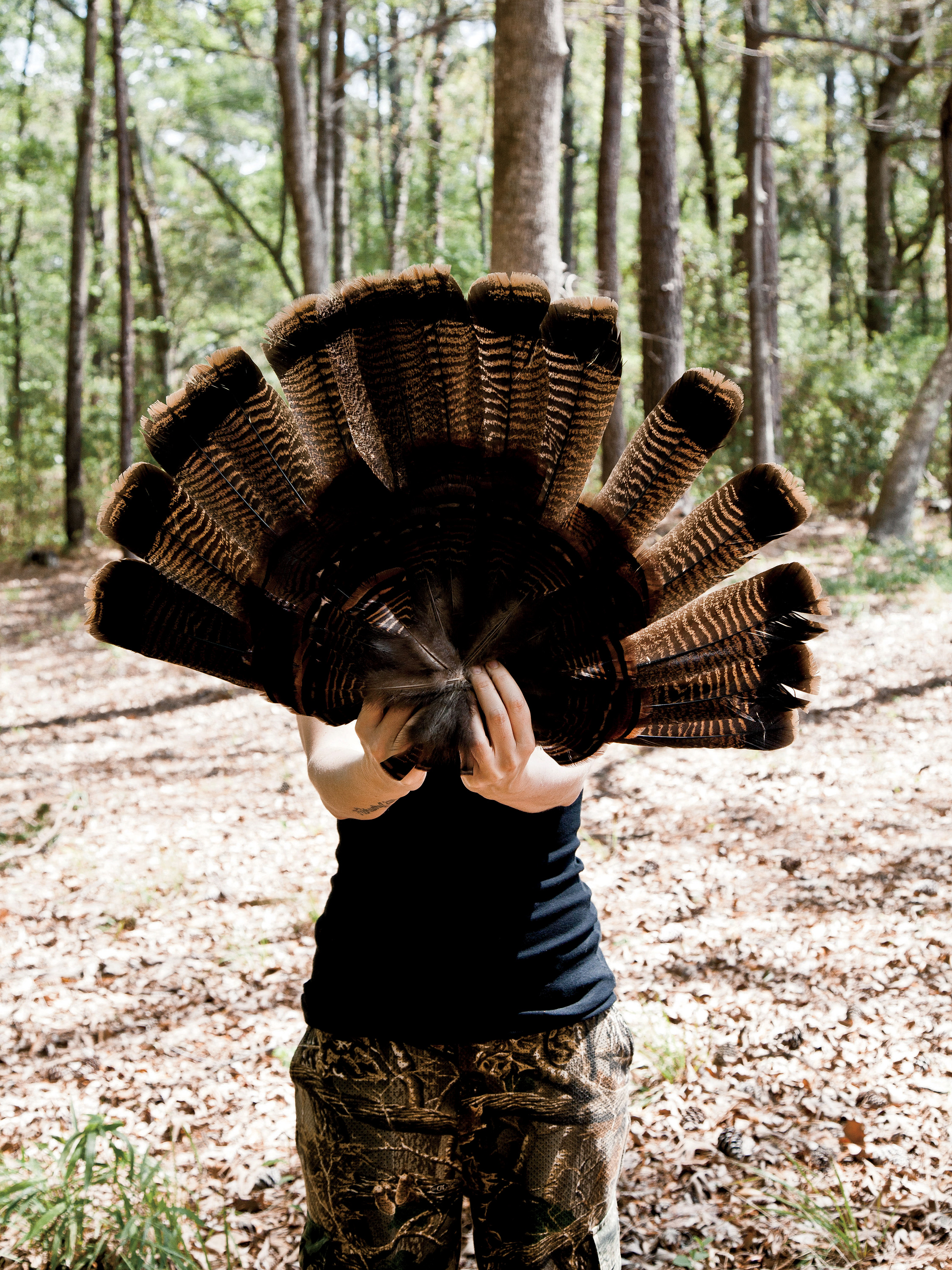
Photo: Peter Frank Edwards
Glock displays the fan from her first turkey.
He imagines what the hen is feeling when she wakes, with the feather ruffling and morning clucks. He intuits when she is ready to leave the nest, to feed, to scuffle for attention, to get busy. He can even play several parts, the dominant hen or the upstart girl trying to usurp territory. All About Eve, wild turkey style.
Walea speaks the language with such fluency, he actually converses with the birds. And it is this as much as anything that makes turkey hunting so compelling. You talk with the animals. More than that. You seduce the animals. You draw them into your company.
Turkey hunting is nothing if not a romance. The goal is to pretend to be a hen convincingly enough that the most dominant—and presumably delicious—gobbler will come to you, flush with expectations of intimacy. The trick is not only to sound like an actual female turkey, but to sound more alluring and irresistible than the whole flock of females already hysterically trotting around the gobbler like tween girls at a Justin Bieber meet and greet. You have to be, quite literally, the bird in the bush. And the whole courtship needs to happen within a short window of time, before the gobbler exhausts himself on the ready hens and decides strutting over to you isn’t worth the effort. Which, as anyone who remembers junior high can attest, can be a right painful experience. And again, what makes turkey hunting unique. Nobody gets rejected by a deer. It takes a turkey to break your heart.
“I am no one’s last call, I will tell you that,” Walea says firmly.
It is 5:30 a.m. and Walea and I are padding into the woods. We are dressed face to foot in camo—turkeys have exceptional eyesight—and traveling light. Walea with $2,000 worth of custom-made calls in his vest. Me with his 20-gauge Benelli M1 Super 90. No scope.
This is Walea’s favorite time of day. His meditation. His meaning. The world just waking up, one creature at a time, no witnesses save us two. These are the hours that buttress Walea, keep him “a happy man.”
“You hear the flying squirrels peeping. You’ll hear a screech owl once or twice. The first little birds to chirp are the redbirds. Watching everything come alive. I love that.”
As the woods go from silence to symphony, Walea briefs me on his turkey hunting code. He doesn’t believe in runnin’ and gunnin’. “I do not like people running up on my birds,” he says firmly. Nor does he suffer chatterboxes, fidgeters, whiners, bad shots who proclaim they are great shots, folks who disrespect the bird in any way, folks who don’t know a hen from a jake, folks who waste the kill, or folks who trophy hunt. Walea shoots only mature gobblers, birds that have lived well and long and whose futures point toward painful and protracted deaths. The longbeards he takes, he eats.
“The idea is to commune with nature,” he explains. “To appreciate what God has given.” Indifference is not part of the code.
We settle behind a small cluster of short palm fronds. Walea looks up, watches for crows. “Crows,” he explained earlier, “will spot a turkey and pick on him. They dip down, mess with his head. Wanna find a turkey, find a crow.”
After a bit, Walea’s performance begins. He commences clucking, plays the part of a newly risen hen, flying from the nest, pecking for breakfast. Almost immediately, he is rewarded with a full-throated, hair-raising gobble. The conversation has begun.
It turns out to be a long, long, long chat.
Easterns, any turkey hunter will confirm, are the hardest birds to hunt. They are skittish. Clever. Discerning. Picky. For several hours Walea and the gobbler communicate. The longbeard comes as close as thirty yards. But he doesn’t commit.
“Stay still,” Walea whispers. “The patience will beat him.”
Also me.
“There are a lot of great callers out there,” Walea said the day before. “But what I’ve grown to realize is you have to sit tight. The gobbler knows you’re there. He remembers there’s a hen out there he hasn’t bred. You have to wait him out.”
So, we wait. The woods go quiet. No rustles. No gobbles. The turkeys are “henned up.” Which is to say, we are basically sitting there, merely feet away, waiting for the birds to stop having sex. It is an awkward time.
After a while, we break for breakfast, Walea’s frustration showing. He knows failing is part of the sport, the bitter that deepens the sweet. And yet, he is determined to try again.
Having given up on the original target, he says, “I’ll try him another time. He outsmarted us today.” We head to a second location. Walea knows of another gobbler down the road. Knows too that the day is getting hot and the hens weary. Walea is hoping the gobbler still has a little desire left in him. Enough to leave the shady pines and venture into the path. (Forget chickens, we know exactly why turkeys cross the road.)
We have just sat down, backs to trees, when Walea hears the turkey in question. He calls to him. A simple howdy, nothing complex. The gobbler wastes no time. He calls back, strutting as he does, the palms vibrating as he makes his way into the clearing. Walea tells me to ready the gun.
Seconds later, the gobbler emerges, plump and eager, his feathers fanned and iridescent in the sunlight. He runs toward our call, toward what he believes to be impending delight, and it is then, at Walea’s urging, that I pull the trigger.
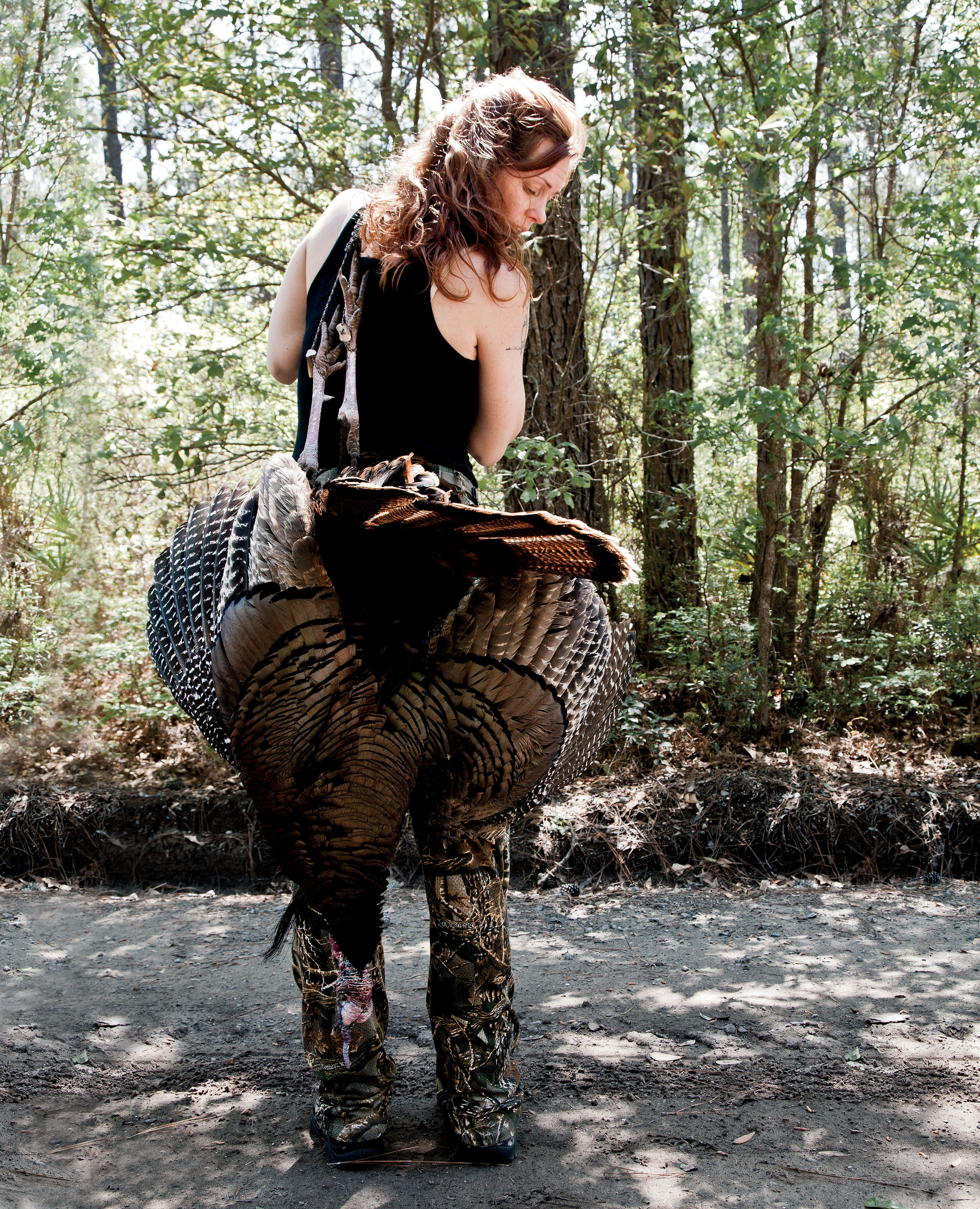
Photo: Peter Frank Edwards
Glock with her turkey.
“You did it! Perfect! Way to go, girl!” Walea shouts, leaping up and rushing to the bird, now thrashing around in the dirt, death throe muscle spasms, Walea assures me.
“It was a clean hit,” he says proudly. “Just perfect.”
Walea turns to look at me, grinning like he’s Oprah and he’s just given me a Chrysler. I am not grinning. I am, in fact, sobbing. Sobbing like he’s Oprah and I’m James Frey.
“I feel horrible,” I choke out. “I don’t even kill spiders in my house!”
Walea’s face falls. He comes over, gives me a tight hug. Then he looks me in the eye and says, “That gobbler was going to die anyway. And in a brutal way.” I nod slowly, not really buying it, convinced I have failed some moral test, that God will hold me accountable in the end, that no number of hours volunteering at the food bank will erase the fact that I took the life from this gorgeous bird, which I tricked, and which, for some unknown, self-sabotaging reason in my head, I named.
“I was calling him Fernando,” I wail.
Walea looks at me with pity. He takes a deep breath, finds my eye again, and says softly, “I’ve cried too.”
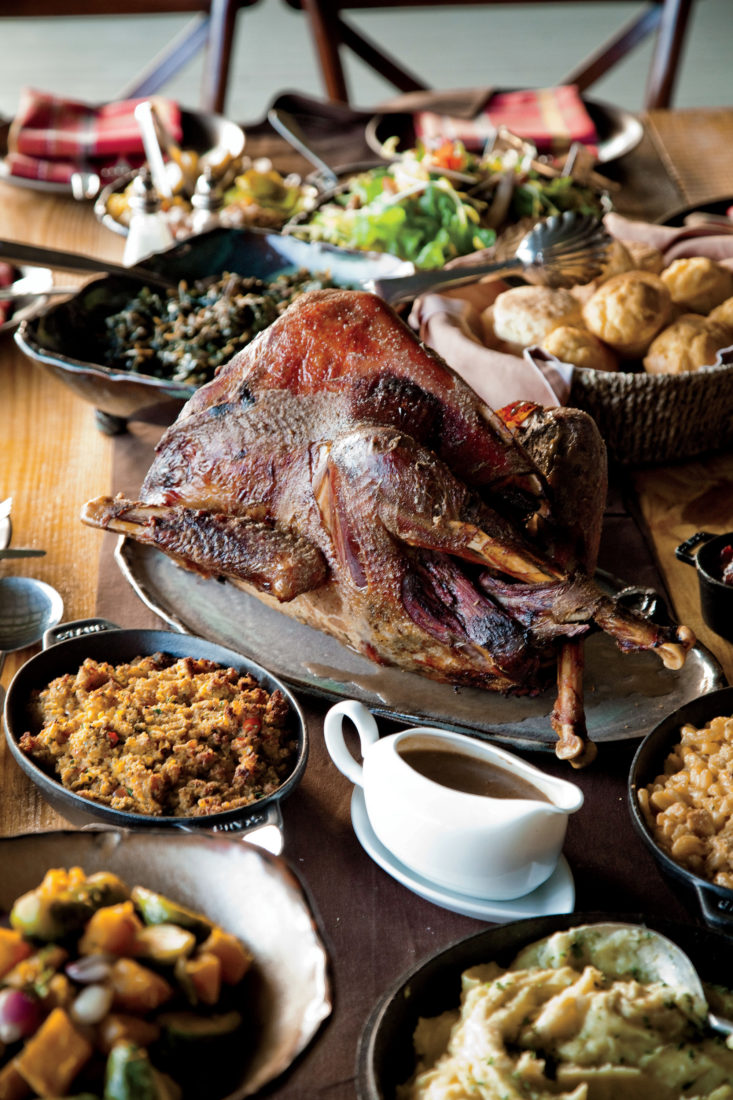
Photo: Peter Frank Edwards
The wild turkey feast with all of the fixings at Palmetto Bluff.
And that is the thing about real hunters. Real hunters love the animals they kill. It is not about trophies, or ego, or dominance. For real hunters, the life they take is already a part of them, and when they take that life, they do so with reverence and awe and the understanding that being struck down cleanly, without pain or suffering, is a far better end than any creature usually has the privilege of meeting.
“These gorgeous birds are my life,” Walea explains. “I like to make sure they get the deaths they deserve.”
That night, we eat Fernando. He is roasted to crisp perfection and surrounded by dressing, cornbread, sweet pickles, greens, and various other savory Southern sides befitting any proper Thanksgiving celebration. We are dining in a screened porch perched over Lake Haynes, a few miles from the preserve where the hunt took place. I look around the table at Walea, his extended family, new friends, my own husband, look too upon the water, the light bleeding out from the sky, a pale wash of pink into the blue. It is beautiful.
And I am thankful. Deeply so.
We say grace. We toast the gobbler. And then we pass the plate. I do not hesitate. I honor his death with appreciation. And extra gravy.


